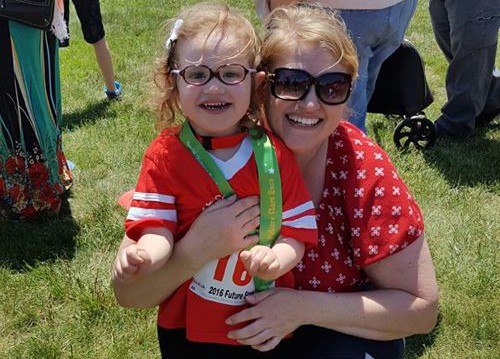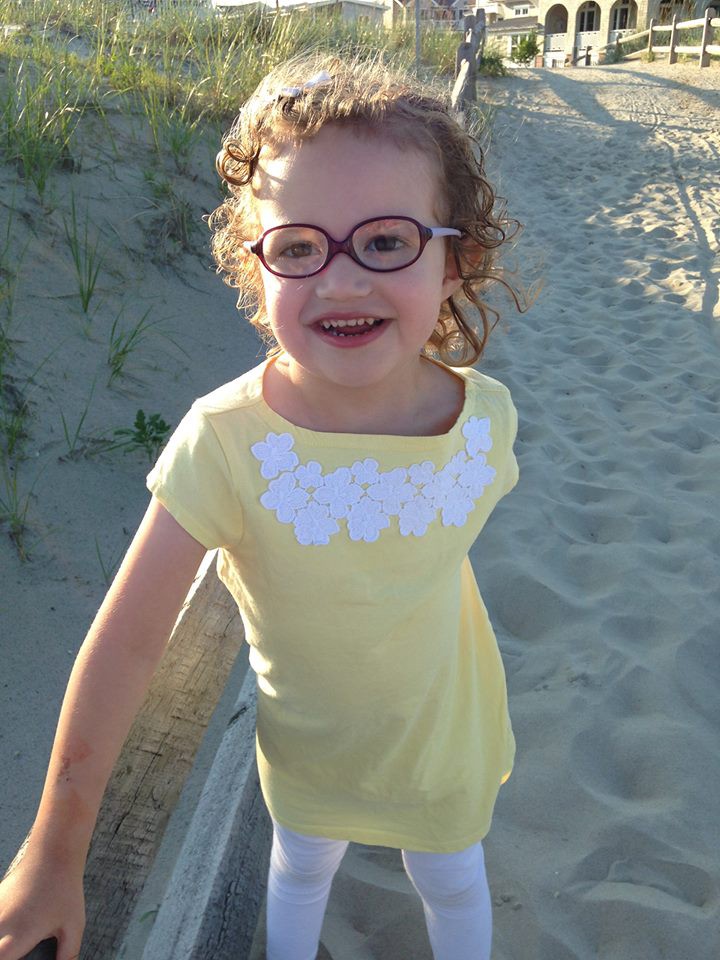
Meredith Schalick’s 5-year-old daughter, Emilia, is one of just 900 people in the world diagnosed with Alternating Hemiplegia of Childhood. Meredith is currently raising money for the Alternating Hemiplegia of Childhood Foundation in hopes of funding AHC research.

Meredith Schalick, a professor at Rutgers Law School in Camden and a single mother from Cherry Hill, knew something wasn’t right with her daughter, Emilia, shortly after she was born a little more than five years ago.
“After Emilia was born, she had a lot of irregular breathing and some unusual eye movements,” Meredith said. “We just knew something was off, but nobody was really sure what it was.”
During infancy, Emilia would have periods where her eyes would flutter. There would also be times where Meredith noticed Emilia wouldn’t use one side of her body.
It wasn’t until Emilia was 2-and-a-half years old when she received a diagnosis. Emilia had Alternating Hemiplegia of Childhood, a neurological disorder where repeated episodes of paralysis occur on one side of the body. According to the Alternating Hemiplegia of Childhood Foundation, the disorder is extremely rare, with it only occurring in one in 1 million people.
There is no cure for AHC, and treatments options are limited. However, through fundraising with the Alternating Hemiplegia of Childhood Foundation, Meredith is determined to help support research efforts so better treatment and a cure may be found for her daughter and others afflicted with the disorder.
A rare form of a rare disorder
It has only been in recent years where doctors and researchers have been able to learn exactly what gene causes AHC.
“They knew it was a protein processing disorder,” Meredith said. “But they couldn’t figure out which of the protein genes it was exactly until the study came out in 2012.”
That year, researchers discovered the ATP1A3 gene was the leading cause of AHC, representing approximately 76 percent of affected patients. The ATP1A3 gene provides instructions for making one part of protein. Since 2012, researchers have identified approximately 30 mutations associated with AHC. For Emilia, her mutation was the first doctors had discovered at the time.
“Nothing was known about the mutation in Emilia’s gene,” Meredith said.
The disorder affects children in different ways. For Emilia, AHC has hampered her fine and gross motor skills development. Meredith said 5-year-old Emilia is at the development stage for a typical 2-and-a-half year old. The disorder hampered Emilia’s muscle development, preventing her from walking independently for long distances. Emilia also struggles with her speech.
“Emilia has had significant developmental delays at this time in her life,” Meredith said.
A recent move to Cherry Hill is helping Emilia develop and interact more with kids her age. Formerly a Collingswood resident, Meredith decided to move to Cherry Hill so Emilia could attend Barclay Early Childhood Center.
“I purposely moved to Cherry Hill because of the Barclay preschool program,” Meredith said. “I wanted her in the very supportive, inclusive environment.”
So far, Meredith said Emilia has done well at Barclay. Emilia’s interaction with other 5-year-olds has encouraged her to try new things.
“She really is motivated by other kids,” Meredith said. “If she sees other kids doing things, she wants to do them.”

Struggles with hemiplegia episodes
AHC episodes are typically associated with triggers. These triggers differ for each patient, but are generally tied to the surrounding environment.
“For Emilia, the biggest trigger is a change in the weather,” Meredith said. “Right now, we’re having unusually warm weather. Emilia’s body is having to adjust its core temperature more than normal.”
When an episode occurs, Emilia’s muscles are unable to support her. When she’s at home, Meredith will typically put Emilia in her wheelchair and keep her seated as upright as possible so she is supported.
For the type of AHC Emilia has, there is no medicine to reverse the effects of an episode. However, for nearly everyone afflicted with AHC, sleeping usually puts an end to an episode.
“You just kind of try to keep her comfortable and try to get her to go to sleep,” Meredith said. “If I can tell she’s not anywhere close to sleeping, I’ll read her some books or we’ll watch TV.”
Sometimes, AHC symptoms are mistaken for seizures. However, seizures can occur in children afflicted with AHC. According to the AHC Foundation, up to 50 percent of children develop “true seizures” at some point during their illness. Emilia has not had a seizure yet, but Meredith said she does have rescue medication in case one occurs.
Support through a foundation
Shortly after Emilia’s diagnosis, Meredith discovered the Alternating Hemiplegia of Childhood Foundation, a nonprofit dedicated to funding research for AHC and providing support to children inflicted with the disorder and their families.
“As soon as we got the diagnosis, I reached out to the foundation and they have been phenomenal,” Meredith said.
Every two years, the foundation holds a Family Meeting where families, doctors and other professionals can connect over the course of a weekend.
Meeting other families who have children with AHC was a huge boost for Meredith, especially with the disorder afflicting so few people.
“There’s so few families geographically close to each other,” she said.
Meredith said she receives tons of support from her family and friends, but adds communicating with other families with children with AHCF allows her to speak with people going through the same experiences.
“That’s our community,” Meredith said. “That’s our village.”
To give back to the foundation, Meredith has recently spent a lot of time and energy fundraising. In November and December, the AHC Foundation is holding a Step Up to End AHC campaign. Meredith has raised more than $2,600 in the campaign so far.
To raise more funds, the Schalick family is partnering with Painting with a Twist in Haddonfield to hold a fundraiser on Dec. 1, with proceeds going to the AHC Foundation.
Meredith explained fundraising is a huge part of AHCF’s mission because of the number of research projects needing funding.
“All of the doctors who are part of the foundation have approved over $400,000 of promising research,” Meredith said. “We just don’t have the money to fund it.”
“Now that we have the gene, that’s great,” Meredith added. “Now we have to find out what kind of medicine we can give our kids.”
The fundraiser at Painting with a Twist will take place from 6 to 9:30 p.m. and will include a raffled for donations from local restaurants and businesses. To register for the event, visit www.paintingwithatwist.com/events/viewEvent.aspx?eventID=840410.
To donate to the Schalick’s AHC Foundation page, visit www.firstgiving.com/fundraiser/meredith-schalick/endahcforemilia.









